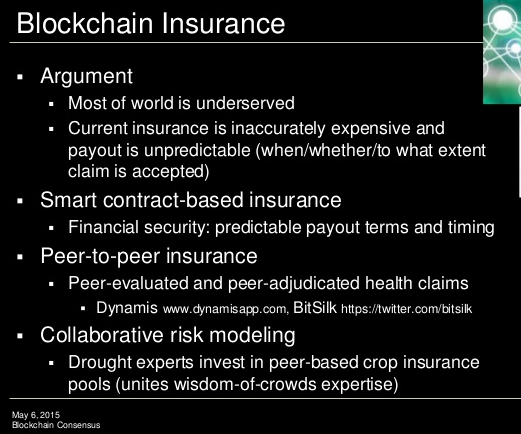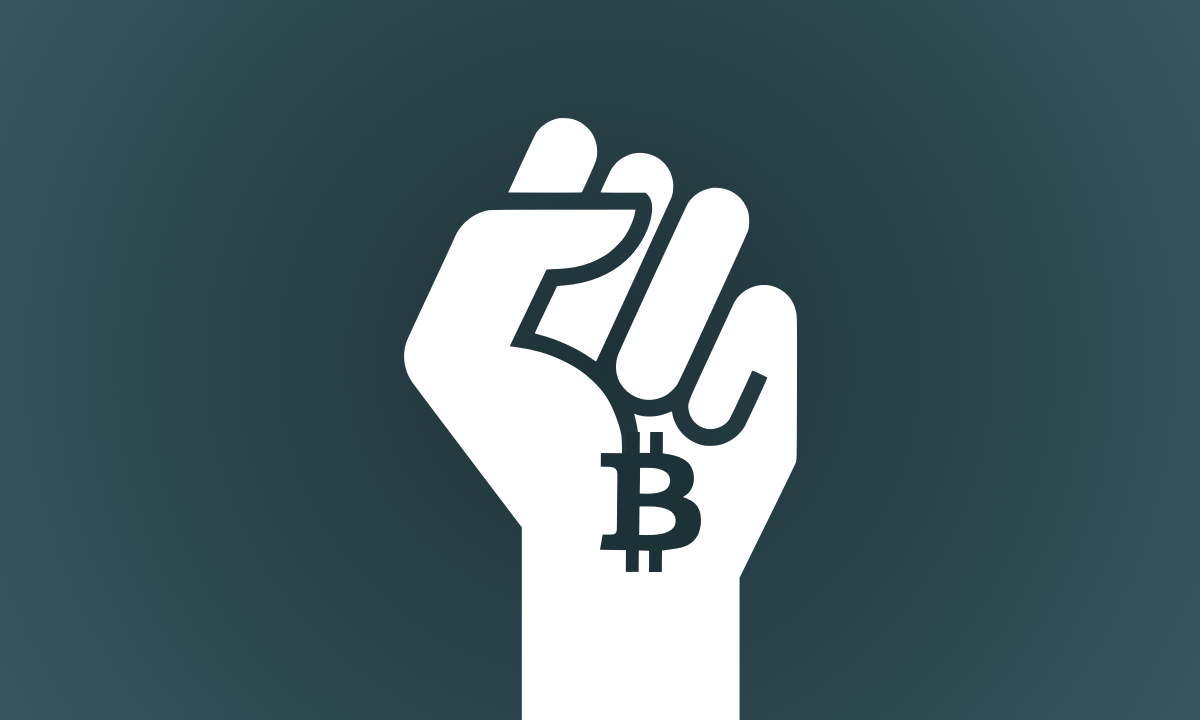
Blockchain Holds Huge Potential for Wholesale Insurance: New Z/Yen and PwC Report
The total worth of Bitcoin today in the blockchain is circa 0.025% of today’s $80 trillion global GDP. The reportfrom World Economic Forum and Deloitte, based on surveys with over 800 executives and experts about new technologies and innovations states that:
“10% of global gross domestic product will be stored on blockchain technology”
But by 2025, 58% according to same research most of these experts and executives believed businesses will hit the tipping point for Bitcoin and blockchain.

New research from Long Finance, sponsored by PwC and conducted by Z/Yen, shows the wholesale insurance* market is enthusiastic about implementing blockchain solutions**. The report is based on interviews with brokers, insurers, reinsurers, regulators and trade bodies from across the global wholesale insurance market.
As well as cost reduction and improved efficiency, blockchain could be a transformative technology changing the way the industry operates, enabling revenue growth in the sector as higher-quality service leads to new business.
The potential for blockchain to deliver substantial value to financial services is enormous. For example, recent estimates*** have found that in banking, consistent use of blockchain in KYC/AML checks alone could save $2.5bn of the estimated $10bn global processing costs in the sector.
Z/Yen and PwC note that relationships with customers, regulators and business partners should improve as blockchain reduces errors and improves accuracy.
PwC’s Belfast-based Blockchain technology team worked with Z/Yen in undertaking the global industry survey, which was the first global initiative intended to determine how Blockchain technology could revolutionise and transform the world’s insurance industry.
The report outlines three areas where blockchain technology could have the greatest impact on wholesale insurance:
Placement process
Facilitating the placement and management of the insurance contract including all relevant documentation, starting with the clients’ insurance application, broker placing the risk, insurers accepting risk, then managing all changes and transactions throughout the life of the contract.
Using a blockchain to store and share documents between brokers, underwriters, the insured and reinsurers would reduce errors, processing time and cost by removing duplicate entry of data and reconciliation, ensure consistency and provide instant access to accurate information. As part of this research PwC built a proof of concept blockchain to demonstrate how this might work.
Claims management
A blockchain incorporating all documents created in a claims process would enable all parties involved to instantly access information, monitor and review the process. This will allow the client, brokers and insurers to handle the claim far more quickly, provide additional information as needed and make faster decisions to enable much faster resolution of the claims.
Benefits include reduced delay and cost, greater legal certainty and improved customer service.

Compliance tasks
Reducing the burden on customers and businesses around proof of identify ‘know-your-customer’, anti-money laundering and sanctions processes.
A blockchain recording customers’ proof of identify documents and evidence of validation would offer a single point of checking and would cut down the time currently spent on multiple checks for a single transaction.
Currently all brokers and insurers involved in an insurance contract have to independently run all of these checks thus creating significant duplication and delay in the placement process which impacts the client.
Removal of this duplication will reduce the processing cost and speed up the placement of the insurance contract which will provide a better and more convenient process for customers. There would also be less risk of error and the negative reputational impacts of this. The possibility of insuring time-critical transactions is introduced.
The report suggests that collaboration, trial and experimentation will be key for wholesale insurers looking to successfully implement blockchain technology. Firms working together to implement blockchain technology will accrue the benefits as their interactions become more efficient.
Jonathan Howe, UK insurance leader at PwC, commented:
“Wholesale insurers have recognised the benefits of blockchain technology and have identified where they’d like to see solutions implemented. The challenge now is to build on this solid beginning.”
“It will be a case of trial and error. Firms need to be realistic – any proposed changes have to be viewed in the context of how they will impact the market as a whole – the industry is data heavy and the actions of brokers, insurers and reinsurers are all interlinked.”
“We must remember that blockchain will not be the best solution for all insurance processes – we must look past the hype. The key is identifying where it will provide value. For some processes it will be game changing. Blockchain has huge promise to be a force for good – it is an enabler for the wholesale insurance sector to continue its role in underpinning the global economy.”
Professor Michael Mainelli, Executive Chairman of Z/Yen Group, commented:
“Mutual distributed ledger (aka blockchain) technology is ideal for supporting multi-party business processes. The insurance community is highly cooperative, with more to gain from greater cooperation. We believe that insurers are likely to build some of the largest blockchain applications outside of the payments sector.”
The study includes a technical Proof of Concept developed by PwC to illustrate how blockchain technology can be applied to solve business problems in wholesale insurance.
Steve Webb, financial services blockchain leader at PwC, commented on the technical Proof of Concept developed by PwC:
“With a new technology that is attracting as much attention as blockchain it is important to be able to demonstrate to people how the technology works. The Proof of Concept we have built picks up on many of the themes in the report.”
“We are able to demonstrate a functioning policy placement demonstration illustrating how data can be distributed between multiple different participants, how the transaction history creates certainty of what offers are made and accepted and how resilience is enhanced as there is no single point of failure.”
About the Report
PwC sponsored Z/Yen to conduct a small Long Finance research project into the potential of Mutual Distributed Ledger Technology (MDLT) in wholesale insurance. The study is a collaborative exercise working with the Long Finance community. A joint team from PwC and Z/Yen brought together a range of wholesale brokers, insurers and reinsurers to create a common view of the potential benefits that MDLT could bring.
PwC in Northern Ireland is the global centre for PwC specialists who exploit and commercialise Blockchain. Blockchain technology, consists of “blocks” of data in a digital ledger, is highly resistant to malicious tampering, thus offering significant security advantages to governments, banks and the financial services sector.
About Long Finance
The Long Finance Initiative was established in 2007 by Z/Yen Group in conjunction with Gresham College to improve society’s understanding and use of finance over the long-term. Long Finance seeks to address the underlying question “when would we know our financial system is working?” through community building and a wide-ranging research agenda. Substantial research has been conducted on mutual distributed ledgers (aka blockchain technology), covering topics from system design to commercial applications. www.longfinance.net
About Z/Yen Group
Z/Yen is the City of London’s leading commercial think-do tank promoting societal advance through better finance and technology. Z/Yen helps organisations make better decisions about enhancing reward, controlling risk and increasing certainty. Z/Yen’s clients are in many sectors, most often where technology and finance try to achieve a social purpose. Z/Yen works with clients to discover, solve, and act on opportunities by managing programmes and projects, building systems, and creating collaborative communities. Z/Yen implemented its first mutual distributed ledgers (aka blockchains) in 1995. www.zyen.com
About PwC
PwC is a network of firms in 157 countries with more than 208,000 people who are committed to delivering quality in assurance, advisory and tax services. Find out more and tell us what matters to you by visiting us at www.pwc.com.
PwC refers to the PwC network and/or one or more of its member firms, each of which is a separate legal entity. www.pwc.com/structure
Footnotes:
*Wholesale insurance is predominantly purchased by organisations from commercial insurers via retail and wholesale brokers who act as the intermediaries between the client and insurer. Wholesale insurance is an important sector in the global economy as it transfers risk from organisations to insurers and therefore underpins large-scale business and trade globally.
**A mutual distributed ledger – more simply referred to as a blockchain – is a computer data structure with the following capabilities:
Mutual – blockchains are shared across organisations, owned equally by all and dominated by no one;
Distributed – blockchains are inherently multi-locational data structures and any user can keep his or her own copy, thus providing resilience and robustness;
Ledger – blockchains are immutable, once a transaction is written it cannot be erased and, along with multiple copies, this means that the ledger’s integrity can be easily proven.
Another way to think of blockchains is as permanent timestamping engines for computer records. Timestamps can be used to prove that data elements were entered at or before a certain time and have been altered.
***Goldman Sachs Investment Research report
HedgeThink.com is the fund industry’s leading news, research and analysis source for individual and institutional accredited investors and professionals




































